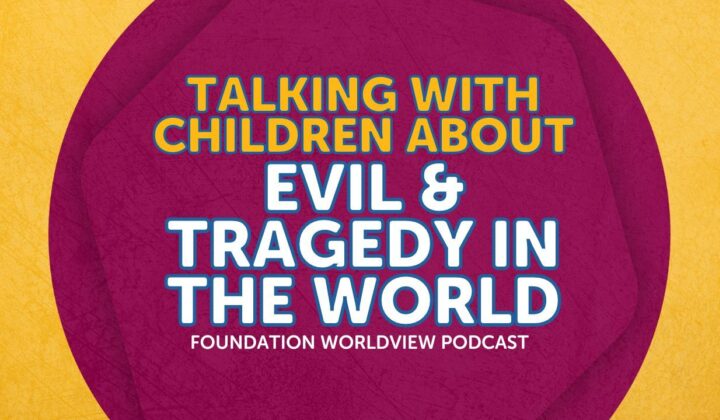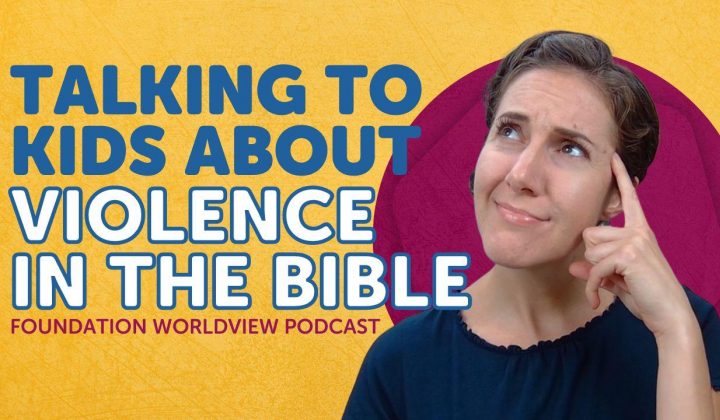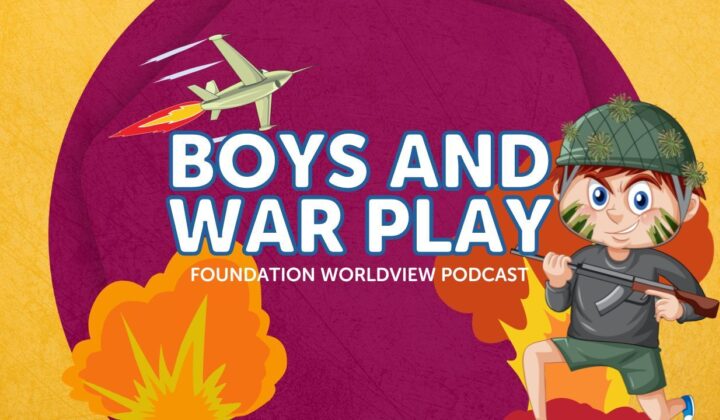Learn more about the journey that led to us equipping kids to carefully evaluate every idea they encounter.
Meet members of our team who have contributed to curriculum development.
Hear from real users of the Foundation Curriculum.
Learn what we believe about God, Jesus, Scripture, and more.
How to Talk to Kids About Violence and Tragedy
Today's question says, "Should we talk about violence such as mass shootings to pray for the grieving families and ask for protection? My girls are six and seven. We do prayer requests at the end of Bible time. At their age, would that cause unnecessary fears and anxiety, or is it good that they know about it?"
Transcript
Note: The following is an auto-transcript of the podcast recording.
Hello friends, and welcome to another episode of the Foundation Worldview Podcast, where we seek to answer your questions so that you can equip the children that God has placed in your care to carefully evaluate every idea they encounter and understand the truth of the biblical worldview. I'm your host, Elizabeth Urbanowicz, and I'm thrilled that you've joined me today for another episode.
Today's question says: "Should we talk about violence such as mass shootings in order to pray for the grieving families and ask for protection? My girls are six and seven. We do prayer requests at the end of Bible time. At their age, would that cause unnecessary fears and anxiety, or is it good that they know about it?"
It's a really interesting question, and I think it's an important one for us to think through. What is the developmental appropriateness of exposing our children to the disasters that happen in this sinful, fallen world?
So that's the question we're going to dive down deep into answering today. But before we do that, if you have found the content of this podcast beneficial, please invest the few seconds that it takes to write a review or give us five stars if you think it's five-star content. Also, if you're watching on YouTube, if you can just give us a thumbs up or write a comment—all those things help more people discover this content so we can equip as many children as possible to understand the truth of the biblical worldview.
The Importance of Developmental Appropriateness
Now, as we think through this question of what should we expose our children to, we need to consider the developmental appropriateness of what we're sharing with our children and how we're sharing it.
I think a good analogy of thinking about developmental appropriateness is just thinking about introducing children to mathematics. When we have a child who is a junior or a senior in high school, they can be doing calculus. When we have a kindergartner, there's no way that they're going to be doing calculus. In fact, most kindergartners aren't even going to be answering verbal math problems.
We know that with a second grader, we can just call out "What is three plus four?" and they can know that that is seven. However, with most five-year-olds, they can't do that yet. And so what do we do? We don't just call out random abstract numbers. What we do is we first introduce them to math through physical objects.
We take out three blocks, we take out four blocks. We have them touch them, we have them count them, we push them together, and then we count them all together and say, "Okay, three blocks plus four blocks is seven blocks." Then after that, after they've gotten that concept down, then we attach the symbols to those concrete objects. And so we'll take three blocks and we'll write the symbol for three below it, and then we'll take four blocks and we'll write the symbol for four below it, and then we add, put the addition symbol and the equal symbol and the symbol for seven. Eventually we're able to show them the flashcard "three plus four," and they're able to call out seven. Then eventually we don't even need the symbol. We can just give the abstract number and say, "Okay, what is three plus four?" And they're able to call out seven.
We don't expect that they can do that immediately when they're just learning about math. But in the beginning, we take out those concrete objects. I'm not saying that we need to pull in something concrete for our kids when we're thinking about talking about difficult situations, but we do need to think, "Okay, what is developmentally appropriate?"
So if there is a mass shooting or if there is a tornado or a hurricane or something like that, the level of detail we're going to go into with a 16-year-old is vastly different than the level of detail we're going to go into with an 8-year-old, or vastly different than the level of detail we're going to go into with a five-year-old or a four-year-old.
Four Key Questions for Parents
I think that anytime we're thinking about a difficult situation in our world and whether or not we should expose our kids to it, and then if we do, what level of detail we should give them, I think that there are four questions that we can ask ourselves to determine the developmental appropriateness for our children.
Question 1: What is the purpose of bringing this event to my child's attention?
Question 2: What would be the result of completely shielding them from such information?
Question 3: How much detail do they need to know?
Question 4: How can I frame this in a way that points them back to the gospel?
Applying the Four Questions: Natural Disasters as an Example
What I'm going to do now is take those four questions and then model for you how I would do this with regards to a natural disaster.
So if you think about a hurricane, a tsunami, a fire, a flood, something like that, we would ask ourselves:
Question 1: What is the purpose of bringing this event to my child's attention?
As I think through this question, I think it would be important to bring a natural disaster like this to a child's attention because:
- They may hear others talking about it, and who knows what they're going to hear others say. So we want to make sure that we're able to ground them in a reality-based understanding of this disaster.
- It's a significant event in our world, and so it's just part of learning modern world history.
- We are called to pray for victims that we know of. If there's a natural disaster happening somewhere that we don't know about, obviously we can't be praying for it, but if we do know about it, we can fulfill the call to lift others up in prayer.
Those would be the threefold purposes of bringing such an event to a child's attention.
Question 2: What would be the result of completely shielding them from such information?
One result could be that they will receive the first information about this tragedy from others. And again, it's not that we want to completely control everything in our child's life. However, when they're in these younger ages—5, 6, 7, 8—most of the information that they receive does come from us and should come from us. And so we want to be the first ones to talk about this with our children.
Also, if we completely shield them from this, we will miss out on the opportunity to guide them through interpreting this disaster, helping them understand why is it that these disasters occur, and also guiding them through praying for others.
Question 3: How much detail do they need to know?
This, of course, is a question if we have determined that it's appropriate to share this event with our children. And I would say when thinking about a natural disaster, from how we answered question number one and question number two, it would be wise to explain this disaster to them.
So now, how much detail do they need to know?
First, I would say with a natural disaster, they should know the basic details of what this type of disaster is—a tornado, a hurricane, an earthquake, a typhoon, whatever it was. Now again, the level of detail that we're going to give a 12-year-old is vastly different than the level of detail that we're going to give a five-year-old. A five-year-old just needs to know the basics. A 12-year-old may have more questions, and we may actually read through a news article with them to help them evaluate the information presented.
Then they should also know that in this natural disaster, people lost their homes, people got hurt, and some people even died. Again, we're going to give a different level of detail to a 12-year-old than to a five-year-old.
To a five-year-old, we might just say: "And because of this tornado, some people, their houses were destroyed, so they don't have a place to live. And other people, they got hurt and they're in the hospital right now, and some people actually died. And so some people lost other people that they love. So we're going to pray for them right now that God would comfort them."
With a 12-year-old, you're going to give a little bit more detail.
Question 4: How can I frame this in a way that points back to the gospel?
So if we're thinking specifically about a natural disaster, I would tie this back into Genesis chapter 3, verses 17 through 19. These verses say:
"And to Adam God said, 'Because you have listened to the voice of your wife and have eaten of the tree of which I commanded you, "You shall not eat of it," cursed is the ground because of you; in pain you shall eat of it all the days of your life; thorns and thistles it shall bring forth for you; and you shall eat the plants of the field. By the sweat of your face you shall eat bread, till you return to the ground, for out of it you were taken; for you are dust, and to dust you shall return.'"
So to point our kids to this—to say, because Adam rebelled against God, God cursed the ground. So the ground has now been affected by sin. And because of this, we have natural disasters like fires and floods and tornadoes and hurricanes and typhoons. That this is not part of God's original good design, but because of our sin, the ground is cursed. And we now have all of these disasters.
Then to say, as we've learned before, this is not the end of the story. And so then we can take our kids to the end of the story to Revelation chapter 21 and read the first four verses with them.
Revelation chapter 21, verses 1 through 4 says: "Then I saw a new heaven and a new earth, for the first heaven and the first earth had passed away, and the sea was no more. And I saw the holy city, new Jerusalem, coming down out of heaven from God, prepared as a bride adorned for her husband. And I heard a loud voice from the throne saying, 'Behold, the dwelling place of God is with man. He will dwell with them, and they will be his people, and God himself will be with them as their God. He will wipe away every tear from their eyes, and death shall be no more, neither shall there be mourning, nor crying, nor pain anymore, for the former things have passed away.'"
And so then talk with our kids through, "Okay, what does this passage reveal about when Jesus returns?" That He's going to make everything new, that the first heaven and the first earth are going to pass away, that He will make all things new. He will wipe all tears from our eyes, and death will be no more—everything will be perfect when God makes heaven and earth new. So we want to make sure we're pointing our children back to the reality of the gospel.
Conclusion
So again, anytime we're thinking about a disaster that happens because of the effects of sin—whether it is direct human sinful choice, like a mass shooting or a war, or whether it's a natural disaster that ultimately does stem back from human sin, but not directly from choices of humans right now—we want to think through these four questions:
- What is the purpose of bringing this event to my child's attention?
- What would be the results of completely shielding them from such information?
- If we have good reasons based on those first two questions to talk with them about this event, then we should ask ourselves: How much detail do they need to know? How much is developmentally appropriate?
- How can I frame this in a way that points them back to the gospel?
Take the Next Step in Equipping Your Children
Navigating difficult conversations with our children requires wisdom, biblical grounding, and age-appropriate tools. If you found this episode helpful, don't miss future content that will continue to equip you with practical strategies for raising children who can think critically and stand firm in their faith.
Join our email list today to receive the latest episodes, resources, and biblical parenting insights delivered directly to your inbox. You'll be the first to know about new content that addresses the challenging questions parents face in today's world.
Related Posts and insights

Talking to Children about Evil and Tragedy in the World
Today's question says, "With all of the school shootings and other evil things that happen around us, how do you recommend talking with children about them? What age do you think is appropriate and how do you best frame this to point to God?"

Talking to Kids about Violence in the Bible
No matter what age, kids are bound to have questions about violence in the Bible. As a parent, it's important to be prepared to answer these questions in a way that is both honest and intentional. In this podcast, Elizabeth Urbanowicz will talk about how to address and talk to kids about violence in the scripture in a way that is developmentally appropriate and sensitive to their unique needs.

Boys and War Play: A Christian Perspective
In this episode, host Elizabeth Urbanowicz delves into war play among boys, exploring the dynamics of battleships to good versus bad scenarios. She offers a biblical perspective on the intent behind such play, discussing the values of imagination, energy expulsion, and leisure.





